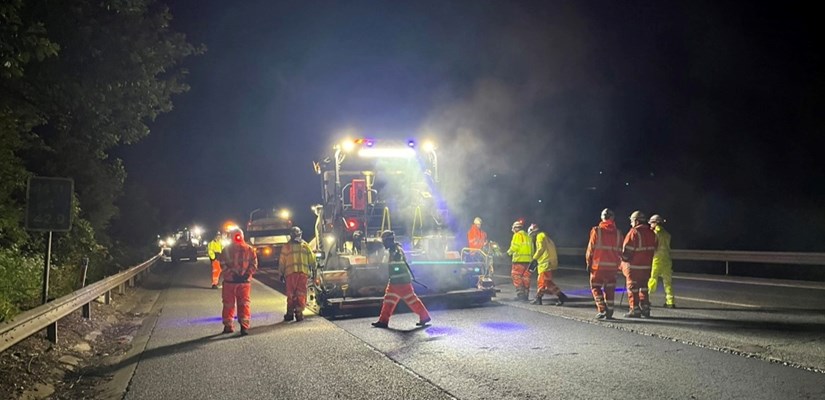
A new carbon-negative aggregate is being trialled on a stretch of motorway as part of the hunt for new and innovative solutions to help reduce carbon emissions in road construction.
The ‘next generation’ construction material was identified in a competition run by National Highways which offered funding for projects that would help meet targets for net zero carbon in maintenance and construction.
Four firms received up to £80,000 each to make their vision a reality and now the first of those – Low Carbon Materials (LCM) – has been able to trial their ACLA product on a National Highways’ road for the first time. ACLA® is a new carbon-negative aggregate that enables the creation of net-zero asphalt.
With the support of both Skanska and Tarmac, the trial is taking place on the northbound carriageway of the M11 in Essex and has been incorporated into essential resurfacing and maintenance work between junctions 7-8. Here it will be subject to ‘real world’ levels of heavy traffic and will have routine monitoring by National Highways.
A test strip of asphalt concrete binder course containing LCM’s carbon-negative aggregate has been laid alongside a control test strip containing 100% conventional aggregate. It is hoped the carbon-negative aggregate will make a significant impact on National Highways carbon emissions with minimal change to standard procedures.
Skanska Chief Engineer Paul Cole said: “The programme linked Skanska with our existing supply chain partner Tarmac, and Low Carbon Materials. Subsequently, a formidable collaborative working relationship was formed.”
Along with Tarmac, Paul and his team’s extensive knowledge of construction materials combined with their industry expertise and understanding of National Highways specifications has been invaluable. Their support has enabled LCM to put in place all the necessary reports and testing to gain approval from National Highways to trial the product.
Paul adds: “The challenge was to responsibly bring LCM’s new product to market as quickly as possible. The programme has been very successful and National Highways Safety Engineering & Standards have supported it throughout.
“Within an eight-month period a new material has been thoroughly tested against Highway Specifications and successfully trialled on the National Highways strategic road network. Eight months ago I didn’t believe that would be possible. It is amazing what can be achieved through effective collaboration.
Dr Joanna White, National Highways’ Research, Development & Innovation Director, said:
“Solutions like this could have a real impact on our road to net zero carbon so we are delighted that we have been able to accelerate the development of the product and get it on one of our roads for testing.
“Collaboration is the key to innovation so we are grateful for the support of our supply chain partners Skanska and Tarmac who have helped make that happen.
“Testing the asphalt in real conditions on a heavily trafficked motorway, under close scrutiny, will be far more effective in proving the durability of the product and hopefully its success.”
National Highways launched the Accelerating Low Carbon Innovation competition, in collaboration with Connected Places Catapult, last year. It is the latest competition funded through Designated Funds, ring-fenced funding used to invest in and support initiatives that deliver lasting benefits for road users, the environment and communities across England.
Low Carbon Materials Chief Executive Officer, Natasha Boulding, said:
"I'd like to thank National Highways, Tarmac, Skanska and Connected Places Catapult, for their invaluable support in piloting ACLA at speed. We are excited by National Highways' recognition of the potential of our carbon-negative aggregate. A motorway trial represents a significant step towards lower carbon roads and widespread adoption. ACLA offers a simple and scalable solution that can be readily adopted by National Highways in their pursuit of their net zero targets.'
Tim Smith, senior technical manager (South East) at Tarmac, said: “Working towards net zero is a priority for Tarmac and our clients so we’re always looking to support the development of new and innovative products to help meet our ambitious targets.
“Fast-tracking this new material to a trial on the strategic network in record time as part of National Highway’s innovation programme represents another important example of how our industry can rapidly develop and trial innovations, getting them from the laboratory and out onto the road network.
To find out more about the low carbon programme visit the Connected Places Catapult page here or for more details of National Highways competitions go here.